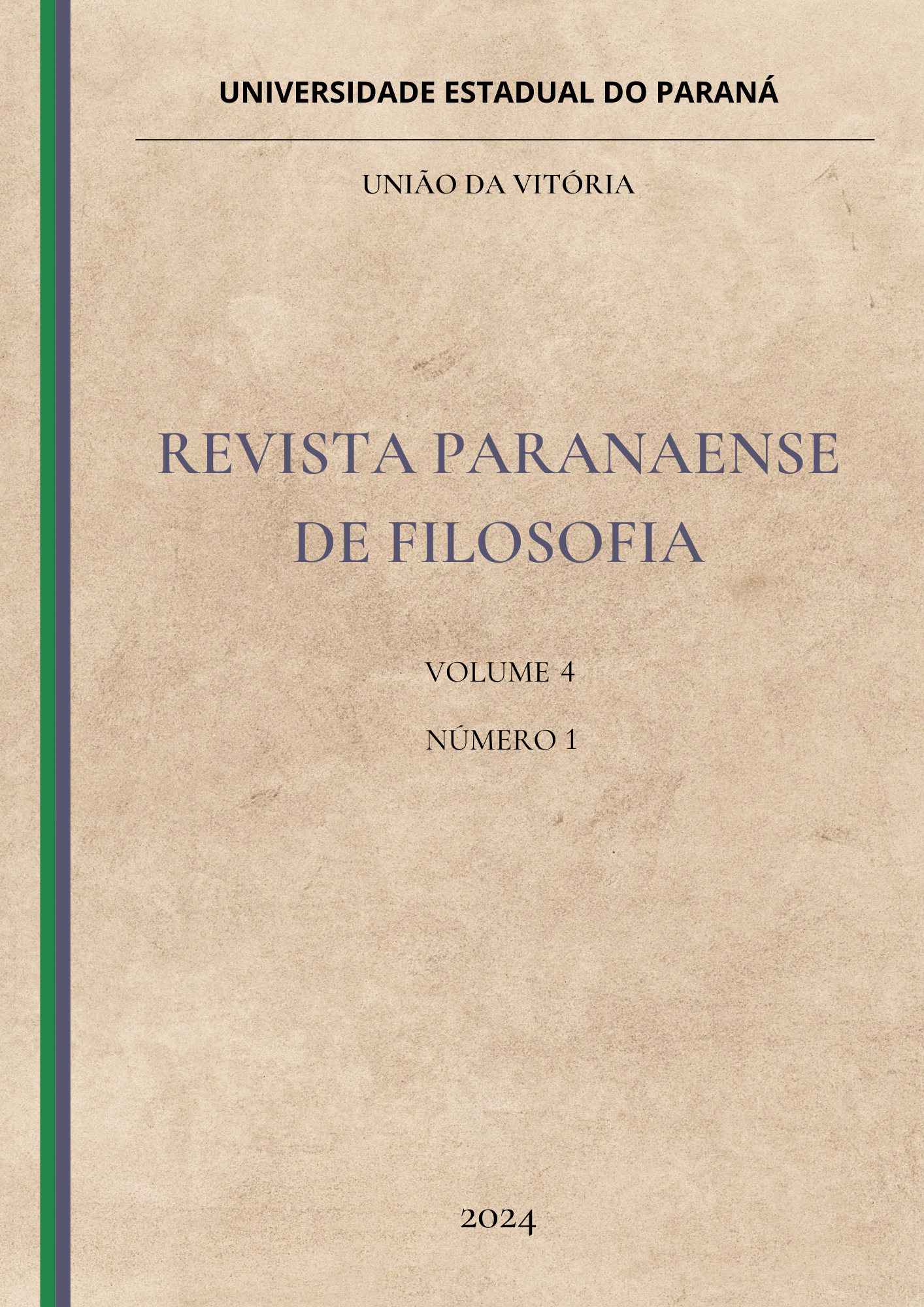POSSIBILIDADES DE AUTONOMIA DA INTELIGÊNCIA ARTIFICIAL
DOI:
https://doi.org/10.33871/27639657.2024.4.1.9192Resumo
O presente artigo busca refletir sobre possibilidades de autonomia da IA, a partir de argumentos favoráveis e argumentos contrários, buscando manter um equilíbrio entre o tecnoentusiasmo e o tecnocatastrofismo. o artigo deixa registrada uma vereda sobre possibilidades de singularização das máquinas digitais, a partir da discussão dos estados objetais não objetiváveis. A instanciação material da Máquina de Turing (conceito abstrato) traria a possibilidade, teórica, de construtos identitários singulares a máquinas digitais. A existência dessa possibilidade deixa aberto o caminho para que as máquinas digitais se tornem autônomas e inteligentes.
Downloads
Referências
BEAVERS, Anthony F. Phenomenology and artificial intelligence. In: MOOR, James H.; BYNUM, Terrell Ward (Org.). Cyberphilosophy: the intersection of computing and philosophy. Blackwell Publishing Ltd., Oxford, UK, 2002. 14p.
BODEN, Margaret A. Minds and mechanisms: philosophical psychology and computational models. New York: Cornell University Press, 1981.
CAPUCCI, Píer Luigi. Por uma arte do futuro. In: DOMINGUES, Diana (Org.). A arte no século XXI: a humanização das tecnologias. São Paulo: Fundação Editora da UNESP, 1997. 16p.
CHURCHLAND, Paul M. Matéria e consciência: uma introdução contemporânea à filosofia da mente. São Paulo: Editora UNESP, 2004.
CLARK, Andy. Being there: putting brain, body, and world together again. Cambridge, Massachusetts: The MIT Press, 1998.
DENNETT, Daniel C. Consciousness explained. New York: Back Bay Books, 1991.
DESCARTES, René. As paixões da alma. São Paulo: Martins Fontes, 1649/1998.
DREYFUS, Hubert L. Desmistificador da inteligência artificial, ante Edward Feigenbaum, especialista em sistemas especializados. In: PESSIS-PASTERNAK, Guitta. Do caos à inteligência artificial: quando os cientistas se interrogam. São Paulo: Editora da Universidade Estadual Paulista, 1993. 8p.
FETZER, James H. Philosophy and computer science: reflections on the program verification debate. In: BYNUM, Terrell Ward; MOOR, James H. (Org.). The digital phoenix: how computers are changing philosophy. Blackwell Publishers: Oxford, UK, 2000. 20p.
FLORIDI, Luciano. Philosophy and computing: an introduction. New York: Routledge, 1999.
______. What is the philosophy of information? In: MOOR, James H.; BYNUM, Terrell Ward. Cyberphilosophy: the intersection of computing and philosophy. Blackwell Publishing Ltd., Oxford, UK, 2002. 32p.
GELERNTER, David. Mirror worlds or the day software puts the universe in a shoebox...how it will happen and what it will mean. New York: Oxford University Press, 1992.
GÖDEL, Kurt. On formally undecidable propositions of Principia Mathematica and related systems. New York: Dover Publications Inc., 1992.
GORZ, André. O imaterial: conhecimento, valor e capital. São Paulo: Annablume, 2005.
HAUGELAND, J. Semantic engines: an introduction to mind design. In: CUMMINS, Robert; CUMMINS, Denise Dellarosa (Org.). Minds, Brains and Computers: the foundations of cognitive science, an anthology. Malden, USA: Blackwell Publishers Inc., 2000. 21p.
HEIDEGGER, Martin. Que é uma coisa? Doutrina de Kant dos princípios transcendentais. Lisboa: Edições 70, 1987.
HOFSTADTER, Douglas R. Gödel, Escher, Bach: um entrelaçamento de gênios brilhantes. Brasília: Editora Universidade de Brasília; São Paulo: Imprensa Oficial do Estado, 2001.
LÉVY, Pierre. . A máquina universo: criação, cognição e cultura informática. Porto Alegre: Artmed, 1998.
______. Cibercultura. São Paulo: Ed. 34, 1999.
MANER, Walter. Heuristic methods for computer ethics. In: MOOR, James H.; BYNUM, Terrell Ward. Cyberphilosophy: the intersection of computing and philosophy. Blackwell Publishing Ltd., Oxford, UK, 2002. 22p.
MATURANA, Humberto. A ontologia da realidade. Belo Horizonte: Ed. UFMG, 1997.
NORMAN, Donald A. Things that make us smart: defending human attributes in the age of the machine. New York: Addison-Wesley Publishing Company, 1993.
PINTO, Álvaro Vieira. O conceito de tecnologia, Rio de Janeiro: Contraponto, 2005. v. 2.
POLLOCK, John L. Procedural epistemology. In: BYNUM, Terrell Ward; MOOR, James H. (Org.). The digital phoenix: how computers are changing philosophy. Blackwell Publishers: Oxford, UK, 2000. 17p.
TEIXEIRA, João de Fernandes. Filosofia e ciência cognitiva. Petrópolis, RJ: Vozes, 2004.
______. Filosofia da mente: neurociência, cognição e comportamento. São Carlos, SP: Claraluz, 2005.
TURING, Alan. Computação e inteligência. In: TEIXEIRA, João de Fernandes. Cérebros, máquinas e consciência: uma introdução à filosofia da mente. São Carlos, SP: EDUFSCar, 1996. 16p.
______. On computable numbers, with an application to the Entscheidungsproblem (1936). In: COPELAND, B. Jack (Org.). The essential Turing: the ideas that gave birth to the computer age. Oxford: Clarendon Press, 2004. 32p.
WEIZENBAUM, Joseph. Computer power and human reason: from judgment to calculation. San Francisco: W.H.Freeman and Company, 1976.
WITTGENSTEIN, Ludwig. Tractatus Lógico-Philosophicus. São Paulo: Editora da Universidade de São Paulo, 2001.
Downloads
Publicado
Como Citar
Edição
Seção
Licença
Copyright (c) 2024 Revista Paranaense de Filosofia

Este trabalho está licenciado sob uma licença Creative Commons Attribution 4.0 International License.
Artigo publicado em acesso aberto sob a licença Creative Commons Attribuition 4.0 International Licence.
Os autores cedem o direito exclusivo de primeira publicação à Revista, sendo o trabalho licenciado simultaneamente sob a licença Creative Commons Attribution 4.0 International (CC BY). Esta licença permite que terceiros remixem, adaptem e criem a partir do trabalho publicado, atribuindo o devido crédito de autoria e publicação inicial neste periódico. Os autores têm autorização para assumir contratos adicionais separadamente, para distribuição não exclusiva da versão do trabalho publicada neste periódico (por exemplo: publicar em repositório institucional, em site pessoal, publicar uma tradução ou como capítulo de livro), com reconhecimento de autoria e publicação inicial neste periódico.



